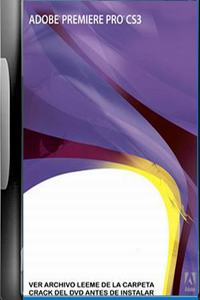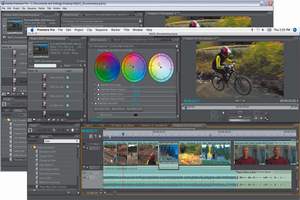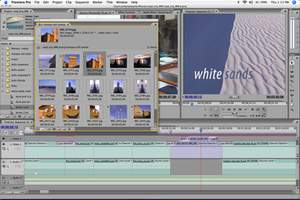
Adobe Premiere Pro CS3
video editor is that it's Windows Vista compatible and, for the first
time in years, Mac compatible. Those updates apparently took most of
Adobe's effort, however, because I identified some features that are
either missing or not yet fully developed.
Adobe Premiere Pro accepts HDV (High Definition Video) footage, as it
did in the previous version, but it still doesn't work with AVCHD
(Advanced Video Codec High Definition) footage when some video editors
Adobe says it may add AVCHD support after this initial release of the
software.
Adobe now bundles its Encore DVD authoring software
and the OnLocation application for setting up video shoots (determining
lighting, sound levels, and so on). Encore adds support for Flash
output and for Blu-ray Disc creation but shuns HD DVD, even though Adobe
is a member of both disc formats' supporting associations.
Dynamic Link, a
big feature added to last year's Production Studio suite, allows you to
send projects from Premiere Pro to Adobe After Effects, or vice versa,
without rendering them first a huge time saver. Premiere Pro has a new
"Export to Encore" feature, but you must still render your timeline
before you can work on it in Encore, so it doesn't seem that useful to
me.
Adobe Premiere Pro CS3
has a few small features that I did find useful. A new Time Remapping
function lets you implement slow motion (or fast motion) directly in the
application's timeline simply by dragging a line on the clip. Though it
makes the task easier, you have to right click and navigate a popup
menu to tell Premiere what you want the line to do (the line also serves
as an adjustment tool for other effects). It would be even better if
you could play your clip and adjust the playback speed in real time. As
it stands, you must make the adjustment and then play the clip (and on
slower machines, you'll need to prerender before you can play the clip),
and if it isn't what you want, you have to perform the process all over
again. The function doesn't work on audio that's linked to the clip,
either.
You can now
create and open multiple asset bins (windows) of video, audio, and
still-image source files. Open a bin in a new window, and you can drag
and drop files into the order you want and then select which files to insert into
a new video sequence, with default transitions automatically inserted.
Plus, you can now substitute clips in a timeline without having to
reimplement existing transitions and effects.
Adobe Premiere
Pro remains the gold standard of video editors, and I appreciate that
Adobe bundles two applications with it instead of making you buy its
expensive suite (rechristened Production Premium CS3) to get them. But
other elements of this year's suite such as Soundbooth, an audio editing
application that's designed for non prosare more compelling than
Premiere Pro is on its own.




0 comments:
Post a Comment